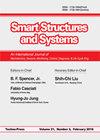Influence of crack on the permeability of plastic concrete
IF 2.2
3区 工程技术
Q2 ENGINEERING, CIVIL
引用次数: 1
Abstract
This study examined the relations between permeability of the concrete due to addition of new cracks. The different concrete types analyzed were standard concrete, reinforced steel fiber concrete, and reinforced concrete polypropylene fiber. In consideration of the improved polypropylene content of polypropylene fiber reinforced concrete, the crack diameter was decreased by 72-93% for up to 0.25% fiber and cracks were eliminated with 0.3% fiber inclusion. In terms of steel fiberreinforced concrete, the results showed that steel reinforcing macro fibers decrease the permeability of cracked concrete at wider crack widths. While the permeability of unreinforced concrete was the highest, 0.5% steel content resulted in lower permeability while a higher steel content concrete with 1% steel had the lowest permeability. Crack stitching phenomenon and the effect of multiple cracks may be attributed to the decrease in the permeability. With respect to normal concrete, the findings showed the crack opening displacement at the highest tension is less than 20 microns. At this loading stage, after unloading, around 80% of the displacement is restored and the residual crack opening is notably small, indicating the low impact of cracking on concrete permeability (CP) and showing that CP was increased with crack width. As a result, adding polypropylene aggregate to concrete could significantly reduce the width of crack, while adding steel fiber to concrete reduces the permeability of cracked concrete compared to normal concrete which may result in a minor crack on CP.裂缝对塑性混凝土渗透性的影响
本研究考察了新裂缝的加入与混凝土渗透性的关系。所分析的混凝土类型有标准混凝土、钢筋钢纤维混凝土和聚丙烯纤维钢筋混凝土。考虑到聚丙烯纤维增强混凝土中聚丙烯含量的提高,当掺量为0.25%时,裂缝直径减小72-93%;掺量为0.3%时,裂缝完全消除。在钢纤维混凝土方面,研究结果表明,在较宽的裂缝宽度下,钢纤维宏观纤维降低了裂缝混凝土的渗透性。无钢筋混凝土的渗透性最高,掺钢量为0.5%的混凝土渗透性较低,掺钢量为1%的混凝土渗透性最低。裂缝拼接现象和多重裂缝效应可归因于透气性的降低。与普通混凝土相比,在最高张力下,裂缝张开位移小于20微米。在此加载阶段,卸荷后,位移恢复80%左右,残余裂缝张开量明显较小,说明裂缝对混凝土渗透性的影响较小,CP随裂缝宽度增大而增大。结果表明,混凝土中掺入聚丙烯骨料可显著减小裂缝宽度,而混凝土中掺入钢纤维可使裂缝混凝土的渗透性较普通混凝土降低,可能导致CP上出现较小裂缝。
本文章由计算机程序翻译,如有差异,请以英文原文为准。
求助全文
约1分钟内获得全文
求助全文
来源期刊

Smart Structures and Systems
工程技术-工程:机械
CiteScore
6.50
自引率
8.60%
发文量
0
审稿时长
9 months
期刊介绍:
An International Journal of Mechatronics, Sensors, Monitoring, Control, Diagnosis, and Management airns at providing a major publication channel for researchers in the general area of smart structures and systems. Typical subjects considered by the journal include:
Sensors/Actuators(Materials/devices/ informatics/networking)
Structural Health Monitoring and Control
Diagnosis/Prognosis
Life Cycle Engineering(planning/design/ maintenance/renewal)
and related areas.
 求助内容:
求助内容: 应助结果提醒方式:
应助结果提醒方式:


